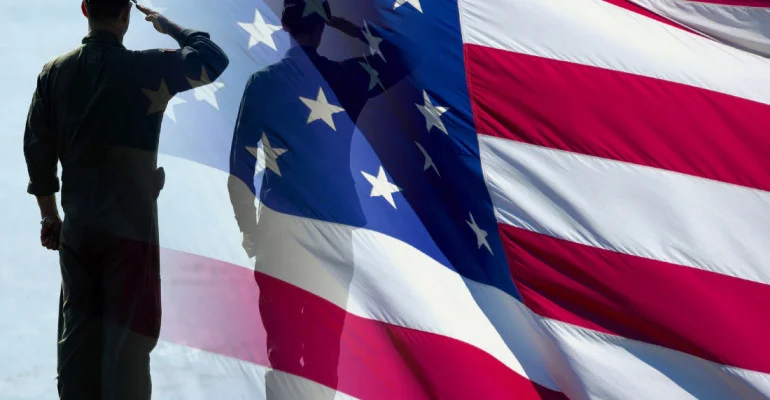By Tom Aiello
A New Form of Veteran Discrimination Emerging
U.S. Navy Adm. (ret.) Mike Mullen coined the term “sea of goodwill” to describe the positive attitudes in the United States toward veterans and the military in general. However, amid the current sea of goodwill there is an undercurrent of discrimination against veterans, and it may surprise you where it is coming from.
The veteran discrimination does not come from anti-war groups or individuals opposed to the military, but instead from employers and organizations looking to assist those who have served. It comes in the form of discriminating against veterans by age or by the conflict in which they served. And it manifests in the form of veterans charities not assisting all veterans in need or employers not hiring all qualified veterans, regardless of age.
The need to help all veterans is real. The most recent report from the Department of Veterans Affairs stated 22 former servicemen and women are committing suicide every day. Of those 22 veterans, around 84 percent are older than 40. Veterans of all ages need assistance.
I will be the first to admit that there are addressable differences among veterans. These are real. Post-9/11 veterans face challenges that can be different from Vietnam era veterans. Female veterans may need different assistance than male veterans.
Focusing on the needs of different types of veterans is a good thing, but it becomes bad when you close the door on a veteran without opening another one. The reality is that veterans have more in common across the war eras than you might expect.
Veterans Seem To Get It
In a recent survey I conducted of 6,300 veterans of all ages, most (95 percent) agreed that they would assist another veteran in need, such as getting a job or providing assistance, regardless of age. In the same poll, 89 percent say their strong kinship with other veterans exists regardless of age.
This fact was brought to life for me most poignantly when talking to Mick Yauger, Army veteran and head of the Teamsters Military Assistance Program. Mick’s words were direct and with the kind of clarity only an Army Ranger can deliver. He said, “When I came back from Vietnam, I did not have a job. I had issues that I was trying to overcome with no help. I’ll be damned if I let that happen to these young veterans that are coming back now.”
Older veterans are most empathetic to younger veterans, and often times are in the best position to assist. But, this too can get distorted.
Veterans “Support” Organizations?
Have you ever heard of the United Spanish War Veterans or the Hispanic War Veterans of America? Probably not. That’s because those organizations served to provide support and camaraderie among veterans of specific conflicts. Even today you see organizations focused on only the Iraq and Afghanistan War, the Vietnam War, or foreign wars in general.
There is something to be learned from an organization like the American Legion, which doesn’t discriminate based on war eras but instead seeks to bind all veterans and assist them in handling the different issues that they face. For example, The American Legion has represented veterans in over 2 million VA claims since 9/11. That is more than any other organization in the United States.
Nearly 100 years after it was formed, The American Legion continues to thrive, with millions of members serving as beacons for thousands of communities worldwide. It shows they must be doing something right to stand the test of time and represent a place for all veterans to get assistance and find camaraderie.
Veteran Charity (To Just Some Veterans)
A close relative to the veterans’ service organization is the veteran charity. While a charity must focus on a specific need, there is something inherently wrong when a veteran is denied the benefits of a charity due to his or her age. Those organizations have a moral obligation to maintain “positive control” (what we say in the military) of that veteran until they are handed off to an organization that can assist them. This cannot be left to chance.
Veteran discrimination was brought to life to me recently at a meeting of non-profits in Chicago. They were talking strategies to assist pre-9/11 veterans coming to them for assistance, because so much of their funding was tied to post-9/11 veterans. This conversation shouldn’t need to take place. I was also surprised to see how blatant some employers were in their approach to hiring veterans.
“Veteran-Friendly” Employers?
Last year, one U.S. company announced a goal to hire 1 million veterans. There was one very distinct caveat. The veterans had to be within 12 months of their separation date and with an honorable discharge.
When I saw that, I was left with the question of why the caveat? There is no change in the tax credits so that could not be the reason. Perhaps it is because the military will pay for a separating service member’s relocation anywhere in the continental U.S. for up to one year after separation. I was left with the conclusion that the company believes that the unemployment rate among young veterans was so great that they chose to place their emphasis on that group. But with their hiring needs so great, why?
A goal of hiring 1 million veterans would more readily be achieved by hiring veterans of all ages. If I served honorably in Afghanistan yet got out of the military 14 months ago with another job in the interim, am I any less qualified than someone more recently discharged?
The most recent annual report on veteran unemployment from the Bureau of Labor Statistics cited 773,000 veterans were unemployed in 2012. There is veteran talent of all ages for employers to hire.
A Challenge For New Thinking
I’m not advocating that organizations and charities change their charter or their focus. I’m suggesting that they set up processes that, if they cannot assist a veteran, they ensure the veteran gets to an organization that can. This should not be something that is implied or hoped for. It should become part of the operating procedures for those charities. They have a responsibility that when any veteran comes to them seeking assistance, whether they provide it or not.
While employers would never admittedly discriminate based on veteran status or age, I challenge them to openly embrace veteran talent of all ages. When running veteran hiring for a major corporation, I was equally affirmed when we hired a veteran from the Vietnam War or the War on Terror. Those veterans came in and demonstrated the type of leadership and experience our organization needed.
Because veterans understand this the most, we must be a part of the solution. This means older veterans applying their experience to assist younger vets and younger veterans helping the aging veteran population with their needs.
If we can start to make this change we are simply following one of the oldest rules held true by the American military — the soldier’s creed that states, “I will never leave a fallen comrade.” These are simple operational changes that, no matter how small, can make profound differences in the lives of so many veterans and ensure that we never leave a veteran behind.
MARCH Marketing provides best-in-class military and veteran expertise to inform strategy, marketing, and services to commercial, government, and non-profit clients. With offices in Chicago, the agency is one of few that provide these type of world-class marketing and consulting services, and the only with deep expertise into the military and veteran audience. When it comes to strategy and communications to military and veterans, MARCH is the agency to call. For more information, visit us at www.marchcorp.com.

